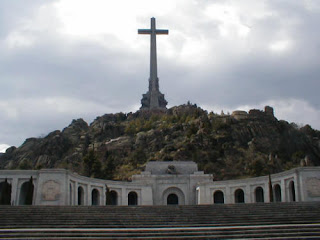I have been asked by a commenter on the Anglo Catholic blog about the laity; what should they do? This is not, of course, for me to say, and anything I write is pure supposition based on what I hope is common sense and some knowledge of how these things work.
The arrangements are already being worked on, no doubt, by Bishop Hopes and others. But what can be said is that nothing can really be established until it is known which clergy will be coming across with which established groups of people.
This will have to be the first stage. Clergy in this situation are asked to have spoken to their Anglican superiors by the end of October. That will set the ball rolling. It will establish fairly rapidly where identifiable congregations will be found and what their needs will be.
In a very few cases, there may be a building and the overwhelming proportion of an existing congregation. This is relatively easy to sort out. I imagine that the schema worked out in the USA, and commented on by Fr Christopher Phillips on
the Anglo Catholic Blog here might provide a model. No Mass was celebrated in this period, but after a month Fr Philips was ordained and everyone received into the Church together. Clearly those Anglicans wishing to identify with the Ordinariate would attach themselves to one of these congregations if that is feasible distance-wise.
The second case will be of a sizeable group with a priest but without a church building. Here Bishop Hopes and his team will need to negotiate a home for the priest and a church for the community. In the case of the church, this will very likely be the use of an existing Catholic church pending more permanent arrangements. Perhaps the Redundant Churches Commission might be persuaded to make over one or other property to such a group. I think, for instance, of St Andrew's Waterloo Street in Brighton which is standing empty but might be very suitable. In all other respects, this group would probably operate like the first.
The third case, more difficult to solve, is where there is a priest wishing to become part of the Ordinariate, but only a smallish handful of laity who have followed him from his old parish, plus one or two from neighbouring parishes. I suspect that the greatest number of takers will be in this category. Here, there will be need for delicate negotiations with local Roman Catholic parishes to find a home and, probably, part-time work, perhaps as a chaplain or part-time Latin-Rite priest in a parish, along the lines I suggested in the last post. No doubt such a priest's work with the Ordinariate will initially be largely liturgical and confined to Mass on Sundays and greater feasts. But this can change, and will change as he becomes known; laity will take the trouble to travel to find his Mass and no doubt some Roman Catholics will find the time, location and ambience agreeable and tag along for the ride. A group like this will either grow or fade out with time. If it grows, it can get its own priest and buildings; if it fades, it fades.
The fourth case is a priest entirely on his own. He, I think, will simply need to be loaned out to a diocese, perhaps full-time, where he can pursue promoting the Ordinariate way of doing things as best he can. He may well find that opportunities will arise of starting something—a Mass in Anglican style, an evensong—which may slowly build interest and eventually a congregation. He may travel around to isolated small groups of Ordinariate Catholics, encouraging them and celebrating the sacraments for them from time to time.
The fifth case is of retired clergy. I see no reason why, especially if they have their pension sorted out, they should simply not be ordained, incardinated to the Ordinariate, and then left to post themselves wherever they choose, helping out, or sustaining and pastoring existing groups as they find them.
Unattached laity are in a slightly difficult position. It is entirely possible that there may be a family or even individuals who are the only members of their parish who think they would like to join the Ordinariate. If this is the case, they will need to travel to where they can find a community to be received with. Thereafter, when they cannot get to one of the centres, they will need to fulfil their Sunday Obligation at the local Roman Rite church, but may certainly regard themselves as being members of the Ordinariate. In time they will either move nearer to the church of their choice, or maybe work towards building something locally. There is no reason why a small group of laity should not meet together in the local Catholic Church to say or sing Evensong together, or even have a visiting priest celebrate Mass for them from time to time according to the Anglican Use (whatever that may prove to be).
Ordination Preparation
The early comers are likely to be ordained with very little additional preparation. This will probably come as a relief to many, but it should not entirely do so. One of the most commonly heard observations made by those who have crossed over in the last twenty years is that 'it is more different than you think'. Canon Law is the obvious case in point. This is a system that clergy will be required to drive; Canon Law cannot be ignored as is sometimes the case in the Church of England. The Law of Marriage, for instance, is the most important element, where doing the wrong thing can actually invalidate the Sacrament, and there are a lot of wrong things that one may do. The necessary information will need to be provided somewhere and somehow. But probably most of it will have to happen after ordination. Just a guess.
Lay instruction
Initially, the same will be true of the laity, that the early takers will be received with little preparation. I am aware that there are Anglican parishes in England that are already systematically studying Catholic Doctrine with a view to joining the Ordinariate, and this is highly commendable. The biggest difference is that the laity will then be
full Catholics, and bound, for instance, to attend Mass every Sunday and Holy day on pain of sin, to confess their grave sins at least once a year, and all the other requirements. Some understanding of why these things are necessary may in some cases be important to have provided
Realistically, there is likely to be quite a bit of coming and going from the Church of England to and from the Ordinariate in the early years. But I expect things will settle down, and the Ordinariate will become part of the normal ecclesiastical landscape, at least in the bigger towns.
In all this, I should emphasize, perhaps, that I have no insider knowledge. I am not on Bishop Hopes' team nor do I know anyone who is. Everything I have written is pure supposition. It just seems to me that if I were in charge, this is what I would do, and I cannot think of another way of doing it.

















.JPG)



